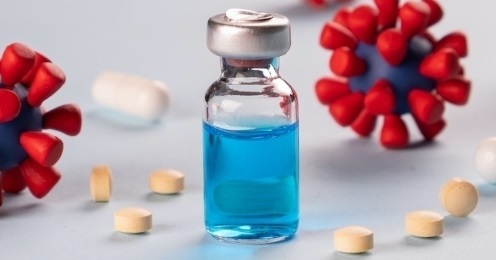Nikhil Prasad Fact checked by:Thailand Medical News Team Jul 12, 2025 7 months, 2 days, 4 hours, 21 minutes ago
Medical News: A new small molecule called RMC113 could be the game changer in fighting COVID-19 and other deadly viruses, according to an international team of researchers from Stanford University, Aarhus University, University of Copenhagen, University of Helsinki, University of Eastern Finland, University of California San Diego, and KU Leuven.
 New Breakthrough Drug Reverses COVID-19 Induced Cellular Damage
New Breakthrough Drug Reverses COVID-19 Induced Cellular Damage
This
Medical News report highlights how this experimental drug works not by targeting the virus directly, but by stopping it from hijacking the body’s cellular systems. Scientists discovered that RMC113 blocks two critical enzymes – PIP4K2C and PIKfyve – which are used by viruses like SARS-CoV-2 (the virus that causes COVID-19) to invade and reproduce inside our cells.
How COVID-19 Hijacks the Body
When a virus like SARS-CoV-2 enters the body, it uses specific pathways in our cells to reproduce and spread. One such pathway is called autophagy – a natural process where cells clean out damaged parts and recycle them. However, COVID-19 disrupts this process, turning it into a tool to help the virus grow.
The team found that the virus’s protein, NSP6, directly binds to and interferes with the enzyme PIP4K2C, causing a buildup of autophagosomes (waste disposal units in cells) that can’t finish their job. This interruption helps the virus stay hidden and avoid destruction.
What the Study Found
The researchers tested RMC113 on infected lung cells and organoids (lab-grown miniature human lungs). The drug not only stopped SARS-CoV-2 from replicating, but it also helped the cell restore its normal cleaning process by fixing the autophagic flux.
More importantly, RMC113 showed strong effects across different types of viruses, including Ebola, dengue, and Venezuelan equine encephalitis virus. It worked by boosting the cell’s ability to clean itself and degrade viral proteins. It was also safe, showing no major toxicity in the tests.
They also created a special “clickable” version of RMC113 to track how it binds inside cells. This confirmed that the drug specifically targets and blocks PIP4K2C and PIKfyve, halting the virus's ability to replicate.
Why This Matters
The current antiviral drugs mostly target the virus itself. But viruses mutate quickly, often becoming resistant to these drugs. RMC113 works differently – it targets the human proteins that viruses rely on. This means it could work against many viruses, even new ones that haven’t appeared yet.
The study also reveals that COVID-19 damages our cellular recycling system, and that fixing this system may be a powerful way to stop the disease and its long-term complications.
A New Hope in Virus Treatment
The discovery of RMC113 and its ability to restore the cell&rs
quo;s defense mechanisms opens up a promising new direction in antiviral research. Unlike traditional antivirals, this strategy works at multiple stages of the viral life cycle – from entry, replication, to virus assembly and exit.
The researchers believe that with further development, RMC113 or similar drugs could become broad-spectrum treatments, not only for COVID-19 but also for other viral pandemics in the future.
The study findings were published in the peer reviewed journal: Nature Communications
https://link.springer.com/article/10.1038/s41467-025-61759-1
For the latest COVID-19 News, keep on logging to Thailand
Medical News.
Read Also:
https://www.thailandmedical.news/news/phytochemical-from-eucalyptus-prevents-covid-19-induced-blood-clots-and-possibly-even-mrna-vaccine-induced-clots
https://www.thailandmedical.news/news/randomized-clinical-trial-finds-that-korean-red-ginseng-extract-shows-promise-in-easing-long-covid-symptoms
https://www.thailandmedical.news/news/how-sars-cov-2-spike-protein-triggers-neurodegenerative-diseases-and-the-potential-of-metformin-as-a-therapeutic-remedy
